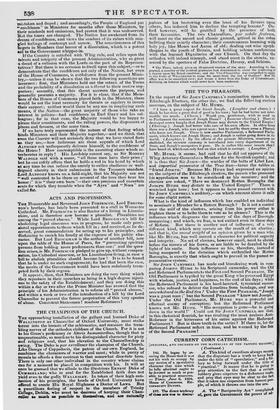THE TWO PHARAOHS.
IN the report of Sir JOHN CAMPBELL'S nomination speech to the Edinburgh Electors, the other day, we find the following curious morceau, on the subject of Mr. HUME.
" I have a great respect for friend Joseph. (Laughter and cheers.) I think be has done a great deal of good in his time ; but he had better not inter- meddle too much. ( Cheers.) Would you, gentlemen, wish to send up to Parliament the nominee of Joseph flume? ( Immense cheering.) have we destroyed rotten buten; that Joseph Hume may dictate to the United Empire? (Cheering.) Joseph had better take care of his own affairs. In olden time. there was a Joseph, who was a great man ; but bv and by there arose a Pharaoh who knew not Joseph. There is now another Parliament, a Reformed Puha. ment, which knows not Joseph Hume; and Joseph is rather going down in the world. (Laughter.) By the efforts of the present Ministers, sinecures are abolished, the strictest economy is introduced into every department of the State, and Joseph's occupation is gone. He is rather like some insects that I have heard of, which can only feed on that which is corrupt. (Laughter.)" Mr. litrmE, it seems, had said that he did not approve of the Whig Attorney-General as a-Member for the Scottish capital; and it is thus that Sir JOHN—the wielder of the bolts of Libel Law, and impartial prosecutor of the True Sun—turns the tables on "friend JOSEPH." Because Mr. HUME had expressed an opinion on the subject of the Edinburgh election, the person who possessed his approbation was to be considered as his nominee; and the electors are asked, " Have we destroverl Rotten Boroughs that JOSEPH HumE may dictate to the United Empire ?" There is wretched logic here ; but it appears to have passed current with Sir JOHN CAMPBELL'S auditory,'—on which account alone it calls for some slight notice.
What is the kind of influence which has enabled an individual to nominate a Member for a Rotten Borough ? Is it not a control over the will of the electors, arising from his power either to frighten them or to bribe them to vote as he pleases? This is the influence which disgraces the memory of the days of Borough- mongering ; and which, we fear, is not extinct even in these days of Reform. But there is another sort of influence, of a very different kind, which may operate on the result of an election; and that is, the moral weight of an opinion given by a man who, like Mr. HUME, has well earned a character for political sagacity and integrity. No set of electors, however small, need to shrink before the terrors of his frown, or are liable to be dazzled by the light of his smile. Such influence as his, therefore, instead of being compared to the dictation which enthralled the Rotten Boroughs, is exactly that which ought to prevail in the purest re- presentative system.
Sir JOHN CAMPBELL has made sad blundering work in com- paring JOSEPH HUME to his Scriptural namesake, and the Old and Reformed Parliaments to the First and Second PHARAOH. The Old Parliament is typified by the great King who governed Egypt with wisdom, justice, and happiness, to the end of his days; while the Reformed Parliament is his hard-hearted, tyrannical succes- sor, who refused to deliver the Israelites from bondage, and was overwhelmed in the Red Sea ! Under the First PHARAOH," Joseph was a great man ;" but the Second PHARAOH "knew not Joseph." Under the Old Parliament, Mr. HUME was a powerful and
effectual enemy of corruption; but the Reformed Parliament
knows not Mr. HUME. "His occupation is gone—he is going down in the world !" Could not Sir JOHN CAMPBELL see that, in this rhetorical flourish, he was rivalling the most zealous Anti' Reformer in the bitterness of his satire against the Reformed Parliament ? But is there truth in the satire? If there is, let the Reformed Parliament reflect in time, and be warned by the fate of the Second PHARAOH!






















 Previous page
Previous page